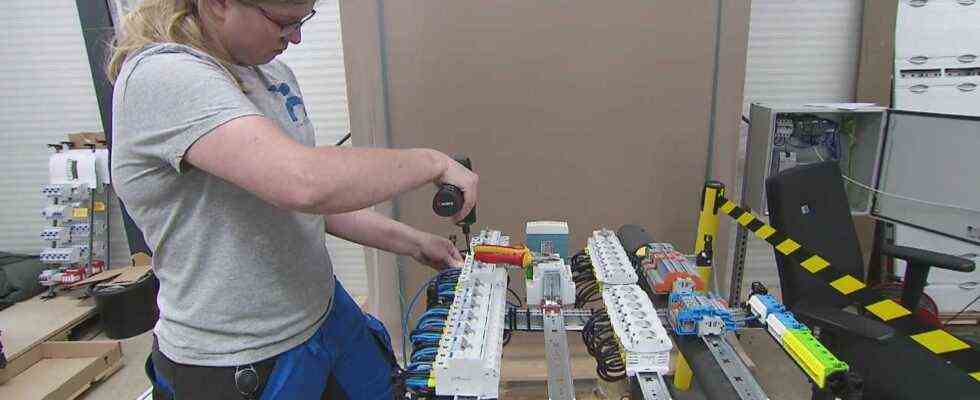Status: 08.11.2021 6:40 a.m.
Germany wants to become climate neutral by 2045. But who should build solar systems and refurbish buildings energetically when there is a shortage of skilled workers everywhere? Experts warn of bottlenecks in the energy transition.
Marvin Fellenzer is currently assembling one wallbox after the other. The budding electrician has been working for the same employer for ten years. A safe, often green job. Still, few want to do it. This is also due to the bad reputation of the craft. Fellenzer finds it wrong: “The pay is good, and the way people work on construction sites today has improved significantly, especially when it comes to working hours and safety.”
Problems in the factories
A number of the trades involved in climate protection and the energy and transport transition are already struggling with a shortage of skilled workers. Construction and expansion, heating and electrical installation and the automotive trade are particularly affected. The Central Association of German Crafts (ZDH) assumes that tens of thousands of qualified employees are lacking. The number will increase in the next few years when many qualified employees leave for reasons of age.
In the overall trade, around 140,000 vacant positions for skilled workers were reported at the end of 2019, i.e. before the corona pandemic. In the pandemic year 2020, there were a good 120,000 despite numerous restrictions and closed operations. Since not all companies report their vacancies to the Federal Employment Agency, the actual number is likely to have been higher. In the obviously energy-relevant areas of energy technology, electrical engineering and air-conditioning technology alone, a good 21,400 skilled workers were sought at times in 2020, according to the BA. A survey by the ZDH also shows that last year 44 percent of the companies in the overall trade were looking for professionally qualified employees, but only 22 percent found what they were looking for.
“Craftsmen are the future makers”
Fellenzer’s employer, the Saarland Montum Group, knows the problem. Currently, because of the subsidies in the energy sector, tenders are increasing, and the company would like to accept more orders. “But if the employees are not available, we cannot do that. We are currently working with the handbrake on, so to speak,” says the commercial director Robert Röhlinger. For example, anyone who orders a wallbox currently has to wait up to six months. And that is still comparatively little.
Whether sustainable mobility solutions, power generation, network expansion, building renovation, building technology or conversion of the energy supply: All these innovations require skilled workers. “Craftsmen are the makers of the future,” emphasizes the President of the Central Association of German Crafts, Hans Peter Wollseifer. You don’t have to be a prophet to predict that the planned resolutions on climate protection threaten to come to nothing if politicians don’t do everything at the same time to strengthen vocational training and attract more young people to it. The shortage of skilled workers then threatened to become “real brake pads for climate protection”.
More than every tenth apprenticeship position vacant
In a statement for the 2020 annual report, the Institute for Employment Research also points out the need for action – especially in training and further education as well as in supporting people and companies who want to deal with the energy transition in their work. A shortage of qualified workers, on the other hand, could seriously impair their success.
But how can you counteract this if young people prefer to take the academic path? In the past year alone, according to the ZDH, 18,570 apprenticeships in the skilled trades remained vacant – a share of 12.8 percent. In addition to better financial support for vocational training and more digital educational offers, real equality between vocational and academic education is also important, says Wollseifer. In order to regulate the equivalence of the education systems in a legally binding manner, the Association of Craftsmen proposes, for example, a law on the classification of qualifications.
A question of image?
In doing so, Wollseifer confirms the impression given by electrician Fellenzer that the image of the craft in society must also change. Many young people decided against an apprenticeship – often mistakenly assuming that studying would guarantee a professional career. “In the meantime, this has turned out to be a blatant misjudgment,” said the ZDH President. In addition, the many climate-relevant professions in the skilled trades offer young people the opportunity to be at the forefront of future-shaping tasks. “The protest at Fridays for Future can turn into very concrete climate protection work.”
Retraining instead of early retirement
The same applies to older employees from other professional areas. Instead of sending the workers made redundant by the structural change into state-financed early retirement, the funds should be used to retrain people, suggests the IAB. Well-trained older employees could use their skills and experience as lateral entrants to implement the energy transition.
Modern and always at the cutting edge of technology – that’s what electrician Fellenzer likes about his job. The climate factor was also important to him as a young father. He therefore hopes that the reputation of the skilled trades will soon improve and interest in them will grow again – so that the energy transition is not slowed down.

